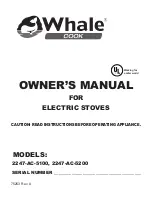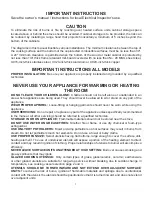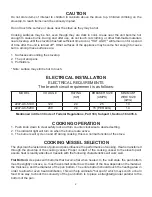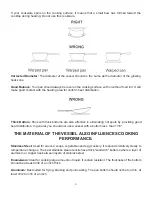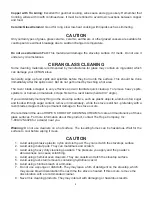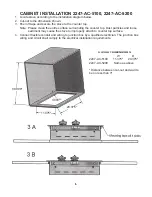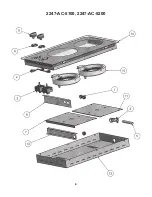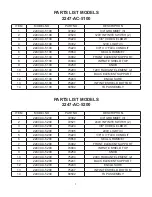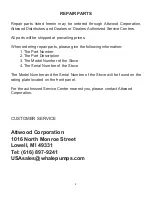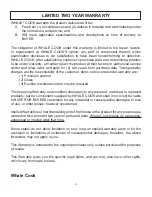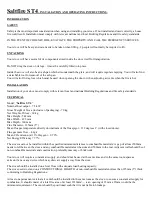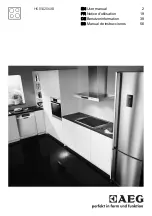
4
Copper with Tin Lining:
Excellent for gourmet cooking, wine sauce and egg cookery. Remember that
tin lining will wear thin with continued use. It must be retinned to avoid toxic reactions between copper
and food.
Ceramic Glass/Ceramic:
Good for long, slow low-heat cooking with liquids such as simmering.
CAUTION
Only certain types of glass, glass ceramic, ceramic, earthware or other glazed vessels are suitable for
cooktop service without breakage due to sudden change in temperature.
Do not use Aluminum Foil:
This material will damage the stovetop surface if it melts. Do not use it
under any circumstances.
CERAN GLASS CLEANING
Some cleaning materials recommended by manufactures for glass may contain an ingredient which
can damage your CERAN stove.
Generally, wipe up food spills and splatters before they burn onto the surface. This should be done
immediately after the spills occur. But do not get burned by touching a hot area.
The razor blade scrapper is very effective and will facilitate quick cleanup. To remove heavy spills,
splatters, or burned-on materials, scrape first with a razor blade (held at 30° angle).
If you accidentally melt anything on the stovetop surface, such as plastic objects, aluminum foil, sugar
and foods with high sugar content, remove it immediately - while the stove is still hot - preferably with a
razor blade scrapper before permanent damage to the stove occurs.
We recommend the use of HOPE’S COOKTOP CLEANING CREAM for care and maintenance of these
glass surfaces. For more information about this product, contact The Hope Company, Inc.
1-800-325-4026 for a dealer near you.
Warning:
Do not use cleaners on a hot surface. The resulting fumes can be hazardous. Wait for the
surface to cool before wiping it clean.
CAUTION
1. Avoid using abrasive plastic, nylon and cloth pad. They can scratch the stovetops surface.
2. Avoid using metal pads. They can metalmark and scratch.
3. Avoid using heavy duty cleansing powders. The pressure you apply and the powder’s
abrasiveness can cause scratching.
4. Avoid using chemical oven cleaners. They are caustic and etch the stovetop surface.
5. Avoid using rust-stain removers containing hydrofluoric acid.
6. Avoid using chlorine bleach or ammonia.
7. Do not use a sponge or dishcloth. They may leave a film of detergent on the stovetop, which
may cause brown discoloration the next time the stove is heated. If this occurs, remove the
discoloration with a recommended cleaner.
8. Never mix cleaning products. They may interact with damaging or hazardous results.

